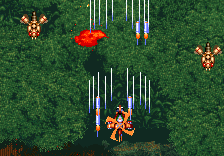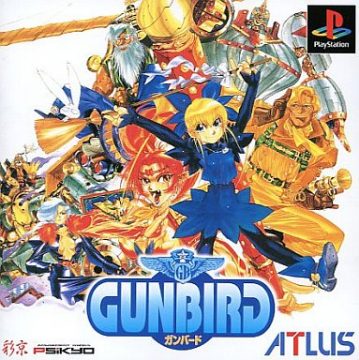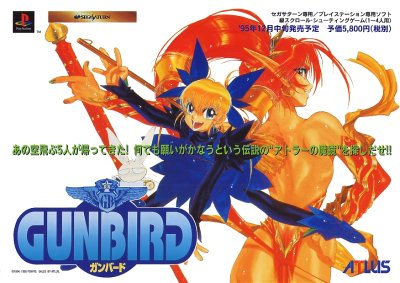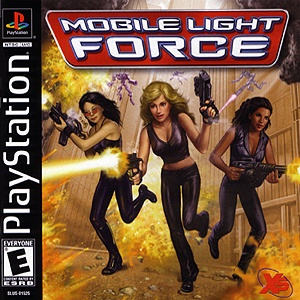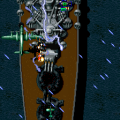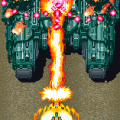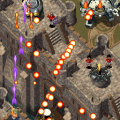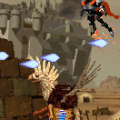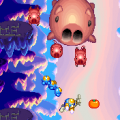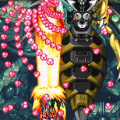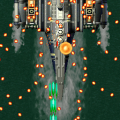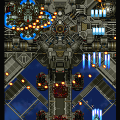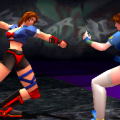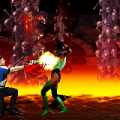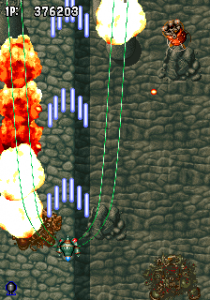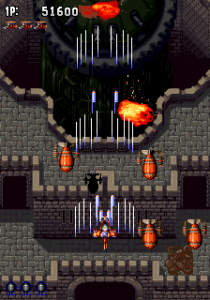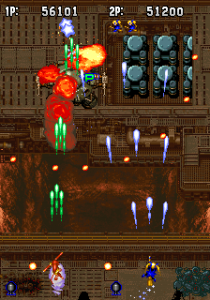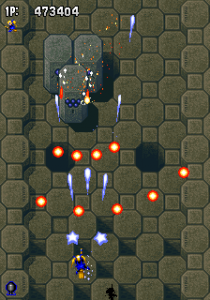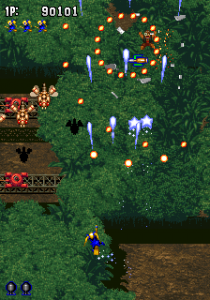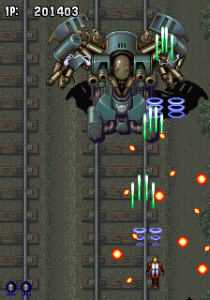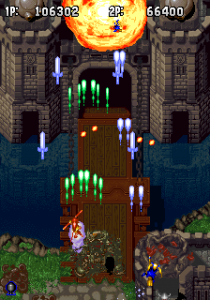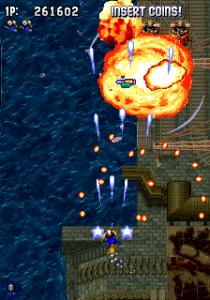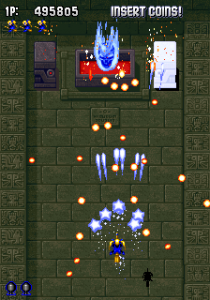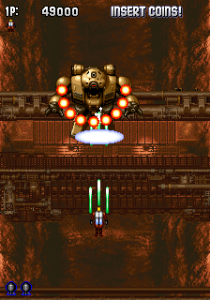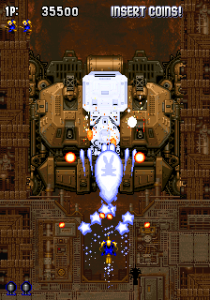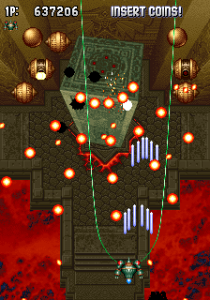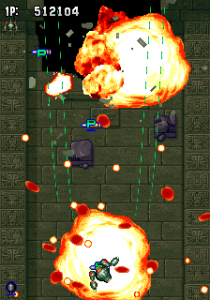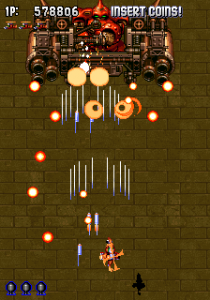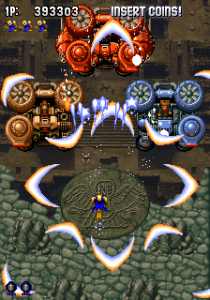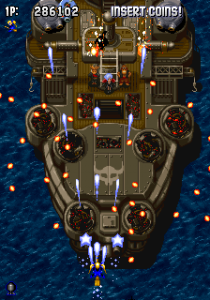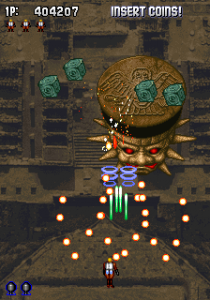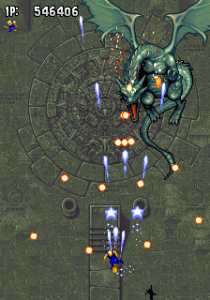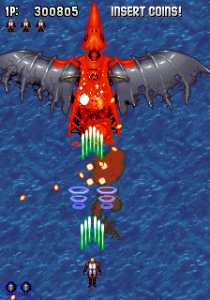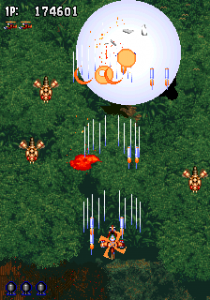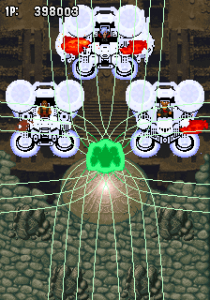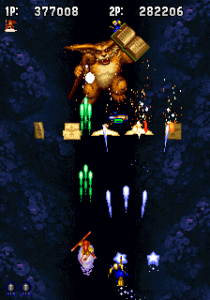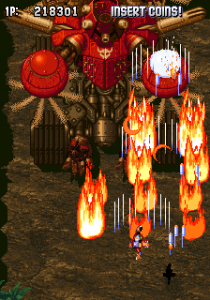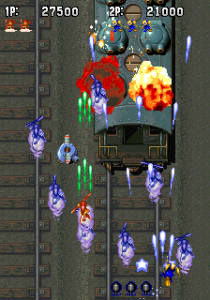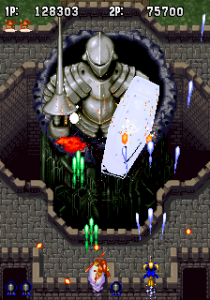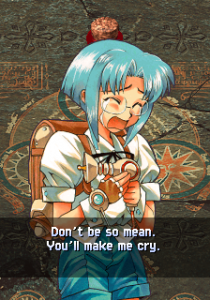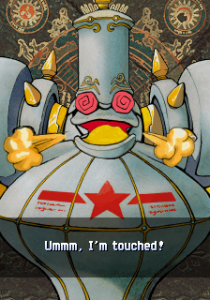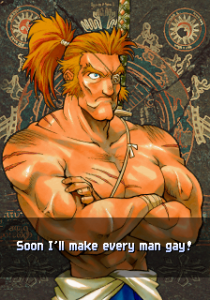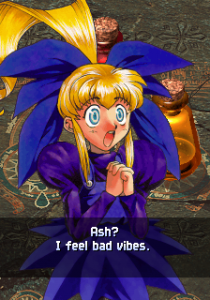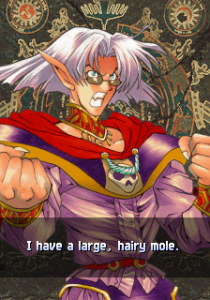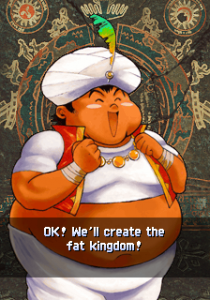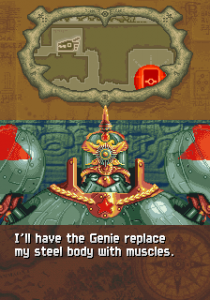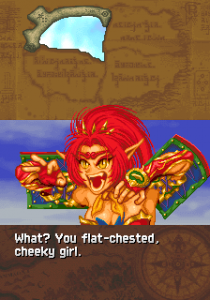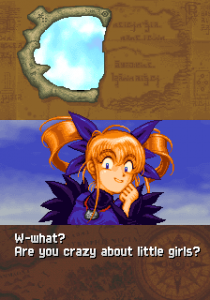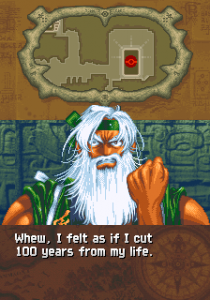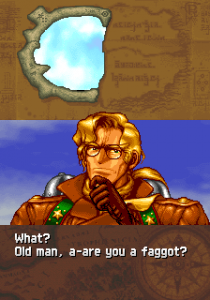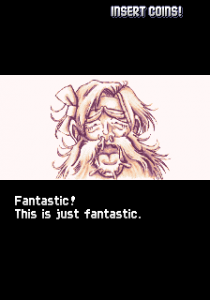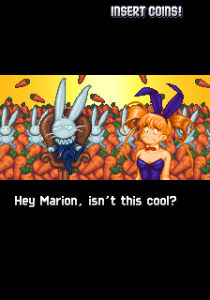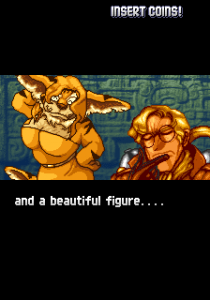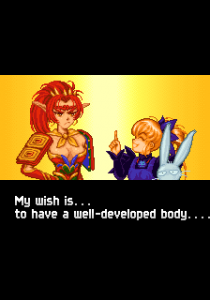Gunbird is a two-game series of shooters from prolific developer Psikyo. They heavily resemble other games from the company, such as Sengoku Ace and Strikers 1945, but with a little more polish. They’re of pretty average quality, and don’t try anything spectacularly new, but never dip into outright bad territory either. The visuals don’t have much of a consistent theme, ranging from fantasy to sci-fi to wild-west, the artwork itself is pretty mediocre, and the music is largely forgettable.
What sets the game apart is its somewhat off-kilter sense of humor. It’s certainly not a cute-em-up in the same way that Parodius is, nor is it as fundamentally bizarre as Cho Aniki. In fact, the in-game visuals are pretty standard fare. But instead the Gunbird games feature a strange set of characters, each with their own plotlines, along with brief story scenes that intersperse the levels. They both have similar stories, too. The first involves seeking out pieces of a magic wish-granted mirror and the second looking for God’s secret hideout (!!) to obtain his medicine.
Characters
Marion
A witch girl that rides on a broom and uses her pet bunny, Pom-Pom, as a weapon. Her goal is to become an adult, because apparently witches are more powerful when they’re adults. She is one of the most popular characters in the series, being somewhat of a mascot for Psikyo at one point. Marion typically shoots homing stars and tosses Pom-Pom as her charge/close range attacks. Her bomb is pretty boring in the first game, shooting crescents everywhere, but is hilarious in the second game, turning all enemies and bullets onscreen into candy. The best part is that you can pick up the candy for extra points.
Valnus / Valpiro
A robot that works for Communist Russia and is equipped with lasers and missiles that he fires constantly. He’s called Valpiro in the second game, possibly to signify his upgrade. He’s short and fat in the first game, but gets an upgrade in the second that makes him look much more fearsome. He’s the only character besides Marion that carries over from Gunbird to Gunbird 2. In both games, he secretly wishes he were a human so that he would not have to follow orders from his communist overlords. In the first game, Valnus has strong lasers that can pierce through enemies and shoot at a wide angle. He also has a short range punch as his charge attack. The punch is pretty hard to hit with because you have to be right in an enemy’s face to get it to hit, but it does a lot of damage. His bomb is a giant laser. In the second game, Valpiro gets a new charge shot where he detaches his hands and sprays bullets everywhere. His electric punch is now his close range attack.
Ash
A pulp sci-fi style adventurer that flies around on a jetpack and shoots a ray gun. He also happens to be a pedophile. Ash has the hots for Marion, but only when she’s young. His niece, Tavia replaces him when Psikyo explicitly states that he is not going to be playable in Gunbird 2 in one of his endings. His actual weapon shoots ring shaped ripple lasers, a huge ball or energy that spreads out once it hits as his charge shot, and a very powerful delayed bomb. Ash is both the fastest character and he also hits the hardest, but the fact that his bomb is delayed means that you really have to memorize boss patterns for him to be effective.
Tetsu
An old martial arts master that drives a flying machine with flapping wings and bicycle pedals. Supposedly, he used to be romantically involved with Sabu, a student of his, until he died. Part of his motivation for seeking out the wishing mirror is to resurrect his dead lover. Tetsu shoots both bullets and fireworks from his flying machine, which looks as strange as it sounds. His charge shot is disappointing, firing around five fireworks at once. It does not take long to charge, though, so it can be useful if you know how to use it. His bomb shoots four streams of fire that move very slow and probably won’t eat up every bullet on screen, making them very poor for defense. They do a lot of damage, though, so they do have some use against bosses.
Yuan Nang
A warrior monkey girl that uses a staff to fight, inspired by the old “Journey to the West” tale. Yuan Nang is not actually interested in making any wishes from the magic mirror. She just wants to beat up monsters and destroy things. Her sub shot shoots huge swords, which not only pierce through bosses and enemies, but also do a lot of damage. Her charge shot has her extending her staff, which also does a lot of damage and has better range than most charge shots. Finally, her bomb shoots a bunch of shadow clones everywhere that pierce right through enemies and bosses, just like the swords. Yuan Nang is a great character for beginners because of her raw power and easy to understand weapons.
Tavia
Ash’s niece. She is on a mission to ask God for medicine to make a cure for her sick mother. She may seem harmless and innocent enough, but at times, she can be just as much of an asshole as Ash, especially in some of her endings. She has largely the same weapons as Ash, but has a few different tricks too. Tavia has a huge pink sword as her close range weapon, which does amazing damage, but like all close range attacks, has bad range. She also has a vastly improved bomb where she calls in three giant robots to fly in and toss grenades everywhere.
Alucard
A vampire that seems like he should be a pretty boy, but has a few problems. First, his hair isn’t real. It’s just a wig. Secondly, Alucard has stinky feet, so stinky in fact, that it can kill people. He is looking to cure his baldness and stinky feet with God’s medicine. He shoots bats as his sub shot and his charge shot fires huge, screen clearing waves of bats. His bomb shoots lasers in the shape of a cross and lets you move while using it, making it very easy to use and very powerful. His close range attack is not worth it, though because it does terrible damage and just consists of him stabbing the enemy with his cape, which is about as effective as it sounds. He has nothing to do with the Castlevania character.
Hei Cob
A fat Indian man who rides on a flying carpet and wears a turban. He takes pride in his weight and boasts it as his greatest strength, but secretly, he wishes he could be thin. People always ridicule him for his weight and no one likes him. Supposedly, God’s medicine will cure him of his obesity or at least make everyone stop making fat jokes about him. Hei Cob moves very slow and shoots slow moving swords as his sub shot. His charge shot shoots a ghost option that fires independently from Hei Cob and moves in circles. His close range attack is tossing a large cartoon bomb that does a lot of damage, but has a delayed explosion. His real bomb calls in a giant dancer girl to smash everything.
Aine
A guest character from Sengoku Ace. While Aine was somewhat respectable and heroic in his own series, in Gunbird 2, he’s a rude and uncontrollable sex addict. Supposedly, his sister Asuka has a cold. Aine is out to get God’s Medicine to cure a simple common cold, which is just as stupid as it sounds. Aine’s 2 player storylines all end with him raping another male character, though thankfully, you never see anything. Aine plays very similar to how he does in Sengoku Ace, shooting a flurry of arrows as his normal shot and flaming arrows as his sub shot. His close range attack has Aine swinging his sword and has much more range than any other close range attack. His charge shot also involves his sword, but instead he shoots a laser from it. Despite being fairly normal with all his other attacks, Aine’s bomb is very weird. He grows huge, blows kisses everywhere, and turns all enemy bullets into flower petals.
Morrigan
Morrigan is another guest character, from Capcom’s Darkstalkers, and is exclusive to the Dreamcast port of Gunbird 2. With all the wackiness and crude humor going on, she fits in surprisingly well with the rest of the cast. Morrigan’s shot homes in on enemies, making her very good for beginners. Her charge shot is her Soul Fist attack, lifted straight from Darkstalkers. Her close range attack shoots a barrage of lights, which has surprisingly good range and hits wide. Her bomb is a little disappointing, though. Morrigan shoots copies of herself. It’s exactly like Yaun Nang’s bomb from the first Gunbird, but flashier.
The Pirates (Gunbird)
Both Gunbird games have a group of three pirates as recurring bosses. Both consist of a woman in a silly outfit as their leader, a strong guy that also happens to be an idiot, and a thin smart guy. They’re always trying to stop the player with increasingly elaborate robot designs. Their wacky recurring boss crew dynamic is the same in both games, but with different characters. They’re called The Trump in the first Gunbird, and consist of Ace, (short guy), Claude (big guy), and a woman known only as The Boss.
The Pirates (Gunbird 2)
In the second Gunbird, the recurring pirate enemies are called The Queen Pirates and consist of Blade (viking helmet), Gimmick (big nose), and Shark (lady pirate). This time they look even closer to the Doronbo gang from the classic Yatterman anime series, which was their obviously inspiration.
Mirror Sprite / Atler
The final boss of the first Gunbird. He is very strong, grants wishes, and calls forth very powerful attacks from a spellbook. Atler bears a very strong resemblance to the character Gizmo from the Gremlins movies. He also tends to shoot bullets when he roars. Alter also has a sense of humor, granting people’s wishes quite literally, leading to some pretty funny endings.
God
The final boss of Gunbird 2. It turns out that God is an elephant with a trumpet and his “angels” are actually frogs. Like the Mirror Sprite’s wishes in the first game, God’s medicine has a way of backfiring in hilarious ways. He’s also noticeably easier to defeat than most of the other bosses in Gunbird 2, having a health bar half the size of the sub boss in his stage, which is strange considering he’s the final boss.
Gunbird was Psikyo’s second shoot-em-up, their first being Sengoku Ace. While it certainly plays like a Psikyo game and has very straightforward, 90s-style sensibilities, it lacks the polish of some of their later games and can feel a little cheap near the end. It’s still a very enjoyable game and offers some very hectic action, but it hardly impresses.
The story involves a bunch of very strange and wacky characters fighting a pirate gang called The Trump for a magic mirror. Supposedly, if the mirror is assembled, a magic mirror sprite will come forth and grant one wish. The game never takes itself too seriously, showing silly dialogue between levels and the pirates acting like morons right before every boss fight. Of note is how Gunbird handles endings. Each character gets a choice of two endings, some of them good and others bad (at least for the characters). Two player endings are always the same, though.
Levels are chosen in a random order, much like in the Aero Fighters series, which was made much of the same team. Most of them are pretty standard shooter levels such as jungles, factories, or forests. Things stop being randomized once you get all four pieces of the mirror and go to the mirror shrine. Once there, Gunbird stops pulling its punches. The enemies get faster, the bosses get tougher, and the levels get longer. This only lasts three levels, the third one mostly consisting of the final boss fight, making Gunbird one of Psikyo’s easier shooters.
The scoring system is very simple. Land enemies and buildings can be blown up and will sometimes have gold underneath them. The gold will cycle from shiny to dull and you’ll get more points if you pick it up when it’s shiny. A similar system was used in the first Strikers 1945 game, but with gold bricks instead of coins.
Gunbird received ports to the PlayStation and Saturn in 1995, fairly early in both system’s lives. Both were published by Atlus, and are done surprisingly well. They both feature a fully animated opening movie, complete with a vocal song. The home versions also feature checkpoints if you choose to continue later on in the game. Weirdly, the PlayStation version cannot save high scores, and is missing a tate mode, which is a dealbreaker if you like to tilt your TV sideways for a full view. The only option is a scroll/wobble mode, which pans the view up and down slightly as you move forward and backward. The Saturn version includes a Tate mode (dubbed “Arcade Mode”) as well as the ability to save your game. From a gameplay standpoint, the PlayStation port is a bit sloppy, too, with bits of extra slowdown.
The Saturn port is pretty much arcade perfect. While both 32-bit versions feature character artwork gallery, the Saturn version also has a ton of fan art, collected from a contest, much like the one in Sengoku Blade / Tengai. There are over 400 illustrations, most of which are decidedly amateurish (and focus predictably on Marion, the cute witch character), along with voice clips of the characters discussing the artwork and a video of the characters of Gunbird picking which ones to put in the disc.
Later, in 2005, ten years after the original Gunbird, a compilation featuring Gunbird 1 and 2 was released on the PS2 by Empire Interactive, long after Psikyo had gone out of business. It was only released in Europe and Japan, much like other re-released Psikyo games. It does not feature any extras like in the Saturn version, though. It’s also missing a true low-res display, like many PS2 shooter ports, and the sound is a bit off. In 2009, the PlayStation version of Gunbird was released on PSN.
Back in 2003, a company called XS Games decided to publish some of Psikyo’s games on the dying PS1, namely Gunbird and Sol Divide. None of these games were localized very well, as huge pieces of text either made no sense or were not even translated into English. GunBird had the honor of being renamed Mobile Light Force, and was released as a budget title. The box art was changed to a completely misleading picture of three Charlie’s Angel style secret agents running through a battlefield with explosions everywhere. The art gallery was completely removed. XS also tore out the story, leaving any and all exposition in the manual. Even though it’s technically the same game as GunBird, Mobile Light Force is generally seen as a mockery.
Besides gutting all the extra content and leaving out the story, XS Games also changed a few of the character names. Hilariously, Valnus was renamed to Milf 2000, Ash was renamed to Jason Last, and Tetsu was changed to John Saurez. Supposedly, Milf 2000’s name was going to be MLF 2000, the MLF standing for Mobile Light Force. Why they changed it to a dirty acronym is anyone’s guess. For those who don’t know, Jason Last and John Saurez were XS employees who worked on the game’s “localization”, Jason Last being from Quality Assurance and John Saurez being the producer. The Mobile Light Force version of Gunbird was the version released on PSN, which is bit of a disappointment.
Strangely, at the same time, XS Games released Mobile Light Force 2 for the PlayStation 2, which is a similarly butchered version of Shikigami no Shiro, a shooter by Taito that is only similar because it has a very character driven storyline and that it features flying people instead of the usual planes or space ships. It uses nearly identical box art too, which comes off as really cheap on XS’ part.
The first Gunbird game was adapted into a graphic novel by Gamest Comics in 1995. It was only released in Japanese, with both story and art by Masato Natsumoto, an artist that worked on many other video games such as King of Fighters, Samurai Shodown, and Record of Lodoss War. It’s around 125 pages long.
